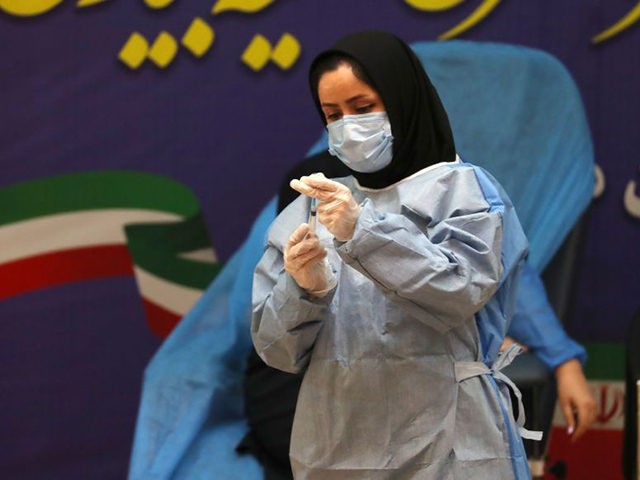Iran’s health minister claimed on Monday that Iran “will be able to export” its domestically produced Chinese coronavirus vaccine candidate “COVIran Barekat” to foreign states “by early winter,” Iran’s state-run Fars News Agency reported on Tuesday.
“In addition to meeting the country’s needs to coronavirus vaccine by fall, we can be an exporter by early winter [sic],” Iran’s Minister of Health and Medical Education Saeed Namaki told reporters at a press conference in northern Iran’s Golestan province on June 21.
“We hope to vaccinate the entire target population by the end of fall in the country,” Iran’s health minister added.
Namaki announced on June 14 that Iran’s health ministry had granted COVIran Barekat emergency use authorization, but did not provide any information on its efficacy or safety. Tehran has failed to publish any clinical data on COVIran Barekat’s safety or efficacy rates since then.
Namaki said on Thursday that a Chinese coronavirus vaccine candidate allegedly developed by the Pasteur Institute of Iran, a state-run medical research center, “will be licensed for emergency injection on Tuesday [June 22], noting that the home-made Razi vaccine is finishing the second phase of human trial and CinnaGen vaccine is in the second phase [sic],” according to Fars News Agency.
The health minister referred to two additional Chinese coronavirus vaccine candidates named “Razi” and “CinnaGen” that Tehran claims to have successfully developed in recent months. Iran’s health ministry has failed to release any clinical data supporting the fact the Razi and CinnaGen demonstrate safe or effective immunity against the Chinese coronavirus. Iran’s state-run PressTV news site alleged on June 14 that Razi could be effectively administered via “inhalation.”
Namaki further announced on June 21 that “the Iran-made Sputnik-V vaccine will be unveiled next Saturday [June 26] in the presence of the Iranian ambassador to Russia.” The health minister referred to Russia’s state-made Chinese coronavirus vaccine candidate “Sputnik V.” Two Iranian companies signed agreements with Moscow in April to develop Sputnik V in Iran.
Kazem Jalali, Iran’s ambassador to Russia, told Iran’s state-run Islamic Republic News Agency (IRNA) on April 15 that Tehran signed a contract with Sputnik V’s financial backer, the Russian Direct Investment Fund (RDIF), to purchase 60 million doses of the vaccine candidate for Iran. Jalali said the RDIF agreed to ship 60 million doses of Sputnik V to Iran between June and December.
In addition to Sputnik V, which has yet to receive emergency use approval from the health regulator of the European Union, Iran has also secured doses of the Chinese state-made coronavirus vaccine “Sinopharm.”
“The Islamic Republic imported one million doses of Sinofarm [Sinopharm] vaccine on Thursday [June 17], which is being distributed throughout the country,” IRNA reported on June 22.
The World Health Organization granted emergency use approval to Sinopharm’s coronavirus vaccine in May despite a lack of published clinical data demonstrating its safety or efficacy rate. Bahrain’s health ministry in late May began offering “booster” doses of Pfizer’s coronavirus vaccine to people who had received one dose of Sinopharm after doubts were raised in the Persian Gulf state over Sinopharm’s efficacy.
The Islamic Revolutionary Guards Corps (IRGC), a U.S.-designated terrorist organization, claimed on Tuesday that it had developed and would soon debut a Chinese coronavirus vaccine.
“The Ministry of Defense-produce vaccine is in the second phase of clinical trials, and the vaccine produced by the IRGC’s University of Medical Sciences will be unveiled in the next few days,” IRGC Major General Mohammad Bagheri told reporters on June 22, according to Iran’s state-run Mehr News Agency.
International observers have accused Iran of downplaying the severity of its domestic Chinese coronavirus outbreak since the country began reporting cases of the disease to the public in February 2020. Iranian political dissidents allege that Iran has largely failed to contain its coronavirus epidemic and suffered much higher rates of infection and death than it admits to. Members of Iran’s own government have openly accused Tehran of lying about the country’s coronavirus caseload.
The People’s Mujahedin Organization of Iran (PMOI/MEK), an Iranian dissident group, estimated in late May that more than 300,000 people had died from the Chinese coronavirus in Iran since its epidemic began. Tehran admitted to just 83,101 deaths from the Chinese coronavirus as of June 22.

COMMENTS
Please let us know if you're having issues with commenting.